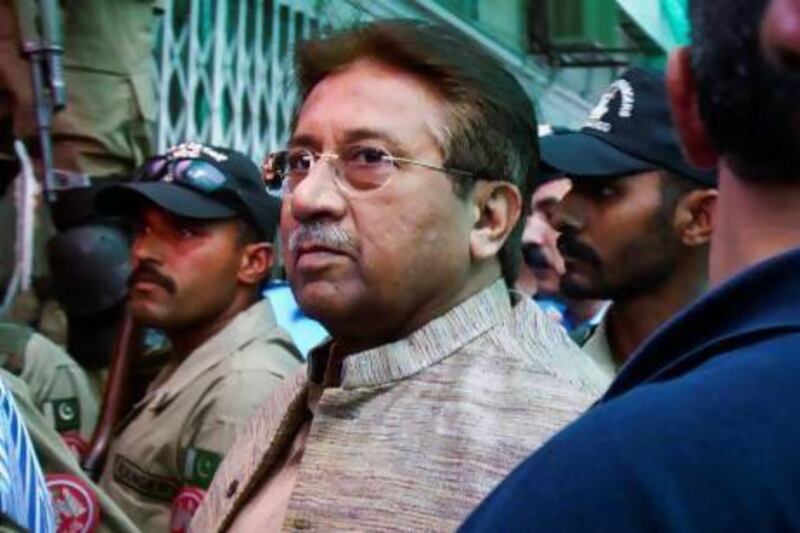RAWALPINDI, Pakistan // A court in Pakistan delayed the indictment of former leader Pervez Musharraf yesterday because it was too dangerous for him to attend the proceedings due to threats to his life.
Mr Musharraf, once Pakistan's most powerful man, had been expected to be charged over his failure to prevent the assassination of former prime minister Benazir Bhutto in 2007.
The closely watched case has shattered an unwritten rule in Pakistan that the top military brass are untouchable. Charging Mr Musharraf would be unprecedented in a country ruled by the military for half of its 66-year history.
Public prosecutor Mohammad Azhar told reporters at an antiterrorism court in Rawalpindi - a military city where Ms Bhutto was killed - that the indictment would now take place on August 20.
"They have received threat letters," he said, adding that Mr Musharraf's defence had formally requested the court delay the proceedings until the security situation improved.
Mr Musharraf was army chief and seized power in a 1999 coup. He later become president and stepped down in 2008.
Ms Bhutto was killed in a gun and suicide bomb attack after an election rally, weeks after she returned to Pakistan from years in self-imposed exile. The government at the time blamed Pakistani Taliban militants and Mr Musharraf has said he warned her of the danger she faced.
A UN commission of inquiry said in a 2010 report Pakistan failed to properly protect Bhutto or investigate her assassination.
Pakistan has been on high alert this week and security has been tight in Islamabad and elsewhere ahead of the Eid holiday.
Taliban-linked militants threatened to kill Mr Musharraf when he returned to Pakistan in March, hoping to contest an election in May after nearly four years of self-imposed exile.
Instead, he was disqualified and became enmeshed in a thicket of legal cases going back to his near 10-year rule.
His lawyer, Ahmed Raza Kasuri, said that intelligence agencies had intercepted messages indicating there could be attacks on various targets including Mr Musharraf's residence just south of Islamabad.
"In view of serious life threats to my client ... we have moved an application in court requesting he be dispensed from court appearance", he told Reuters.
Pakistan's new civilian prime minister, Nawaz Sharif, who was toppled by Musharraf in the 1999 coup, stormed back to power in the May election.
He has pushed for less army involvement in domestic affairs but behind the scenes the military is still believed to be calling the shots.





